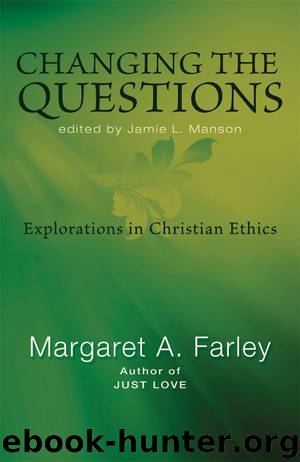Changing the Questions: Explorations in Christian Ethics by Margaret Farley

Author:Margaret Farley [Farley, Margaret]
Language: eng
Format: epub
Publisher: Orbis Books
Published: 2015-02-28T23:00:00+00:00
CHAPTER 9
Ethics, Ecclesiology, and the Grace of Self-Doubt
What is the influence of ecclesiology on ethics, or ethics on ecclesiology? The tempting answer to both of these questions, framed almost anywhere we want to look in the long history of the Roman Catholic Church, is simple: There is no influence, one way or the other. Theological construals of what the church is or should be have little to do with the content of moral theology, and moral theology (or ethics) is seldom brought to bear on our understandings of church. If we limit the questions to the recent history of Catholic theology, say from the middle of the twentieth century to the beginning of the twenty-first, the answer seems even clearer. Ecclesiology and ethics share a common context, the church, but they seldom if ever interact.1
However tempting such a response may be, the historical and contemporary situations are much more complex. In the past or the present, if theologies of church as such do not shape moral theology and vice versa, the actual mode of life in the church does influence its moral discernment and teaching. And—at least to some extent—our understandings of church have an influence on its life. We can say more than this, however. In an important sense, the twentieth century was the century for ecclesiology, and the last third of the century has frequently been described as the “age of ethics.” It was therefore inevitable that theological paths would cross—that ethical assessments would be made of the church itself, as well as of theologies of church, and that interpretations of the nature and function of the church would play a role in ethical debates.
It is instructive to trace twentieth-century interactions between ecclesiologists and church leaders and between church leaders and moral theologians. The most dramatic interactions are adversarial, and the debates turn less often on issues of morality than on issues of church authority. Though some of the participants play more than one role, the adversaries are frequently church leaders and moral theologians, with ecclesiology providing the main lines of the no-longer-surprising plot. A more sobering interpretation of the drama, however, recognizes this as only a subplot. The major story is about what happens to the vast numbers of faithful members of the Catholic Church—largely observers of the subplot, though relentlessly drawn into it, with their lives at stake. A key question raised by this story is: Why is the church's teaching on many ethical issues so divisive or so ineffective? Or, to narrow the question more fairly: Why does the official teaching of the church on certain ethical issues appear to be unconvincing to so many of its members?
The answer to this question may be embedded in the story itself, or it may be obscured by the more visible onstage actions that are part of the subplot. This essay explores the lines of the subplot, but in search of an understanding of the main one. It begins with the work of Charles E. Curran, the moral
Download
This site does not store any files on its server. We only index and link to content provided by other sites. Please contact the content providers to delete copyright contents if any and email us, we'll remove relevant links or contents immediately.
The Lost Art of Listening by Michael P. Nichols(6485)
Why I Am Not A Calvinist by Dr. Peter S. Ruckman(3775)
The Rosicrucians by Christopher McIntosh(3059)
Wicca: a guide for the solitary practitioner by Scott Cunningham(2712)
Signature in the Cell: DNA and the Evidence for Intelligent Design by Stephen C. Meyer(2507)
Real Sex by Lauren F. Winner(2483)
The Holy Spirit by Billy Graham(2430)
To Light a Sacred Flame by Silver RavenWolf(2359)
The End of Faith by Sam Harris(2299)
The Gnostic Gospels by Pagels Elaine(2035)
Nine Parts of Desire by Geraldine Brooks(2011)
Waking Up by Sam Harris(1964)
Heavens on Earth by Michael Shermer(1959)
Devil, The by Almond Philip C(1907)
Jesus by Paul Johnson(1894)
The God delusion by Richard Dawkins(1857)
Kundalini by Gopi Krishna(1829)
Chosen by God by R. C. Sproul(1768)
The Nature of Consciousness by Rupert Spira(1694)
